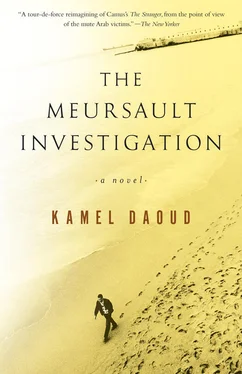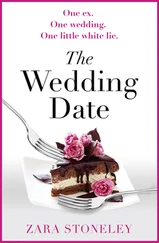The color of the sky was no concern of mine, so I went back to my room and slept for a few more hours. Around midday, a hand pulled me out of my sleep. Mama, of course, who else? “They came looking for you,” she told me. She wasn’t panicked or worried; she figured they couldn’t kill her son twice, and I understood that. Some secondary rites still needed to be performed before Musa’s story could really end. It was a few minutes after two in the afternoon, I think. I went out into the little courtyard and noticed two empty cups, some cigarette butts, and traces of footsteps in the dirt. Mama explained that the two gunshots in the night had alarmed the djounoud . Some people in the neighborhood had pointed to our house, so two soldiers had come to hear our version. My mother said they’d eyed the courtyard vaguely, accepted the cups of coffee, and asked questions about her life and her household. Well, I guessed the rest right away: Mama had put on her show. She told the djounoud about Musa and made such an impression on them that they ended up kissing her forehead and assuring her that her son was well and properly avenged, as were millions of others killed by the French every summer afternoon at two o’clock sharp. “A Frenchman disappeared last night,” they told her before leaving. “Tell your son to come down to the town hall, the colonel wants to talk to him. You’ll get him back. We just have a few questions to ask him.” At this point, Mama interrupted her account and examined me. Her little eyes seemed to be asking, “What are you going to do?” Then she lowered her voice and added that she’d made everything vanish, from blood traces to murder weapon. Not far from the lemon tree were a couple of extra-large cowpats … Nothing of the previous night remained, neither sweat nor dust nor echo. The Frenchman had been erased with the same meticulousness applied to the Arab on the beach twenty years earlier. Joseph was a Frenchman, and Frenchmen were dying more or less everywhere in the country at the time, and Arabs likewise, for that matter. Seven years of the national War of Liberation had transformed your guy Meursault’s beach into a battlefield.
For my part, I perceived what the new lords of the land really wanted from me. Even if I showed up with the Frenchman’s body on my back, my crime wouldn’t be the one the eye could see, but that other crime, the one the intuition could guess: my strangeness. Already. I decided not to go down to the town hall that same day. Why not? Not out of bravery, and not by calculation, but only because of the general torpor I found myself in. In the afternoon, the sky looked fabulously rejuvenated, the sight is committed to my memory like a date. I felt light, in balance with the other weights on my heart, and relaxed, and fit for idleness. Equidistant between Musa’s grave and Joseph’s. You must understand why. An ant ran over my hand. I was nearly stunned by the idea of my own life, the proof of it, its temperature, in contrast with the proof of death, just two meters away from me, there, under the lemon tree. Mama knew the reason why she’d killed, and she was the only one who knew it! Neither Musa nor Joseph nor I was affected by her certitude. I raised my eyes and saw her sweeping the courtyard, bending toward the ground, discussing things with dead relatives or with some ladies, former neighbors who now resided in her head. For one moment, I felt sorry for her. The numbness in my arms became a poignant delight, and I watched the shadows slowly sliding over the walls of our courtyard. Then I fell asleep again.
In fact, I slept for nearly three days straight, a heavy sleep with waking moments that barely revealed to me my own name. I stayed there in my bed, unmoving, without ideas or projects, my body new and amazed. Mama, playing the game of patience, let me alone. Every time I think about those long days of sleep, I find them strange, because outside that courtyard the country was still being torn apart by the celebrations of its freedom. Thousands of Meursaults were running in every direction, and so were Arabs. That meant nothing to me. It was only later, weeks and months afterward, that I started gradually discovering the immensity of both the destruction and the joy.
Ah, you know, I never bothered myself to write a book, and yet I dream of committing one. Just one! No, don’t be so sure, it wouldn’t be a new investigation into your man Meursault’s case. It would be something else, something more intimate. A great treatise on digestion. There it is! A kind of culinary book, combining aromas and metaphysics, spoons and divinities, the people and their bellies. The raw and the cooked. Someone told me recently that the best-selling books in this country are cookbooks. Well, I know why. While Mama and I were waking up from our drama, staggering but maybe, finally, appeased, the rest of the country was devouring everything, gobbling up the land and the rest of the sky and the houses and the power poles and the species that couldn’t defend themselves. As I see it, my countrymen don’t eat exclusively with their hands but with everything else too: with their eyes, feet, tongue, and skin. Everything gets devoured: bread, sweets of all sorts, meats from afar, fowl, all kinds of herbs. But in the end, apparently, that’s no longer sufficient. The way I see it, these people need something bigger as a counterweight to the abyss. My mother used to call that “the endless serpent,” and I think it’ll lead us all to premature death, or to someplace on the edges of the earth where we can topple over into the void. You see? Take a good look at this city and the people here, all around us, and you’ll understand. They’ve been devouring everything in sight for years. Plaster, the well-polished round stones you find on the seashore, the remains of all sorts of posts. As the years have passed, the beast has become less picky and even eats whatever pieces of sidewalk are available. Sometimes it advances right up to the threshold of the desert — which owes its survival only to its blandness, I believe. It’s been years now since the animals ceased to exist, reduced to images in books. There are no more forests in this country, none at all. The big, bulky swans’ nests have disappeared as well. As a teenager, I never got tired of admiring those nests, perched on the tops of minarets and the last churches. Have you seen the landings in the apartment blocks, the empty living quarters, the walls, the colonists’ old wine cellars, all those ruined buildings? They make a meal. I’m rambling again. I wanted to tell you about the first day in the world and here I am, talking about the last one …
What were we talking about? Ah, yes, the days after the crime. Well, as I told you, I didn’t do anything, I slept while the people were devouring the incredible country that had been given back to them. Those were days without names or language; I saw people and trees differently, from an unexpected angle, over and above their usual designations; I returned to primordial feeling. For a brief while, I knew your hero’s genius: the ability to tear open the common, everyday language and emerge on the other side, where a more devastating language is waiting to narrate the world in another way. That’s it! The reason why your hero tells the story of my brother’s murder so well is that he’d reached a new territory, a language that was unknown and grew more powerful in his embrace, the words like pitilessly carved stones, a language as naked as Euclidian geometry. I think that’s the grand style, when all is said and done: to speak with the austere precision the last moments of your life impose on you. Imagine a dying man and the words he says. That’s your hero’s genius: He describes the world as if he’s going to die at any moment, as if he has to choose his words with an economy of breathing. He’s an ascetic.
Читать дальше












